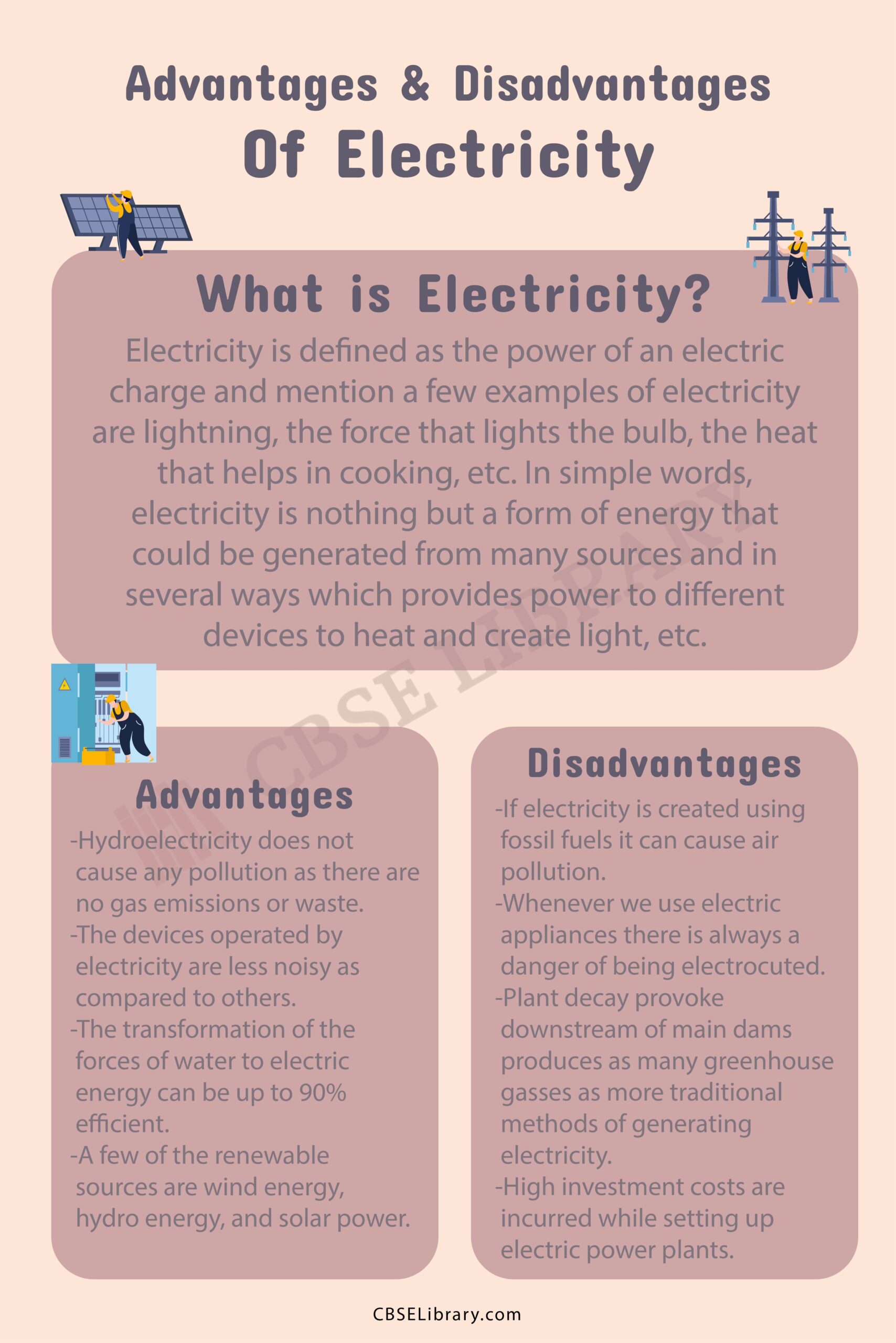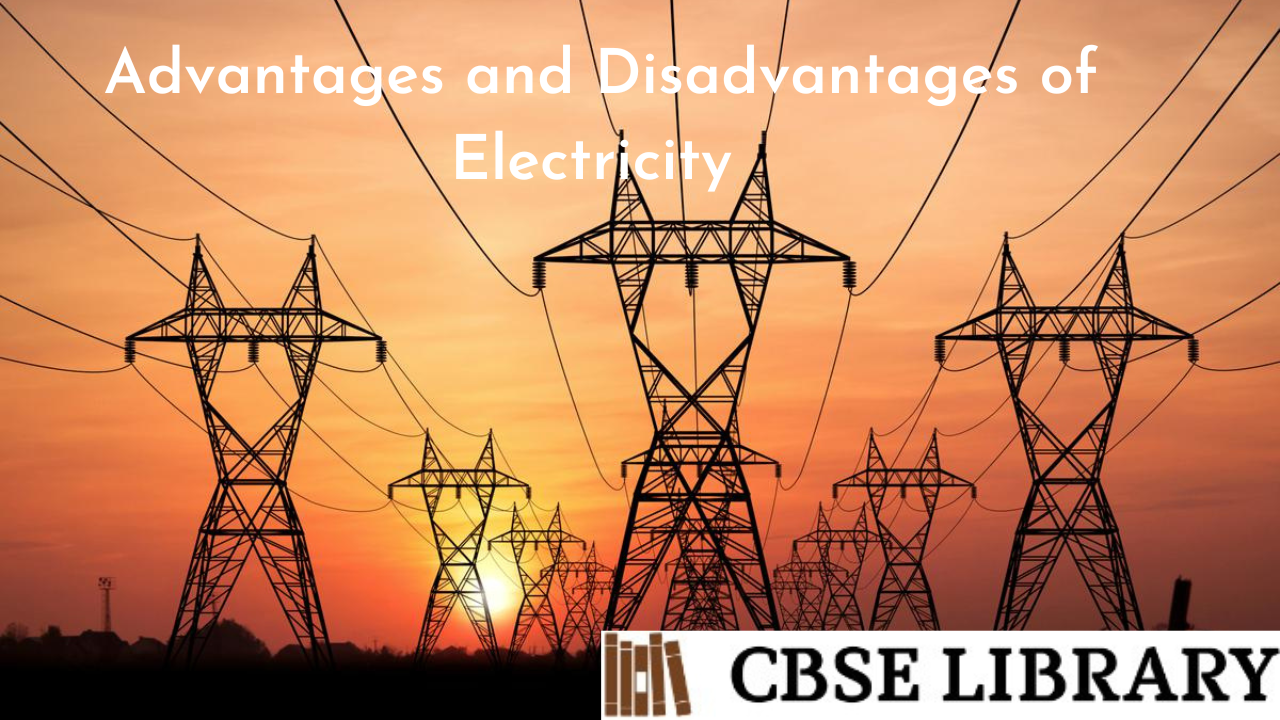Advantages and Disadvantages of Electricity: Electricity is secondary energy converted from other primary sources of energy such as coal, natural gases, oil, nuclear power, and so on. It is a type of power or energy that we use in our daily life to make heat, light, and power to use different kinds of machines, etc. Electricity is mainly generated by three sources which are fossil fuels (coal, natural gas, and petroleum), nuclear energy, and renewable sources of energy. However, nuclear power is the major factor in electricity production which is 1.5 to 2 times more than natural gas and coal units, and 2.5 to 3.5 times more reliable than wind and solar plants.
Students can also find more Advantages and Disadvantages articles on events, persons, sports, technology, and many more.
What is Electricity? What are the Advantages And Disadvantages of Electricity?
Electricity is defined as the power of an electric charge and mention a few examples of electricity are lightning, the force that lights the bulb, the heat that helps in cooking, etc. In simple words, electricity is nothing but a form of energy that could be generated from many sources and in several ways which provides power to different devices to heat and create light, etc.
- Importance of Electricity
- Uses of Electricity
- Advantages of Electricity
- Disadvantages of Electricity
- Comparison Table for Advantages and Disadvantages of Electricity
- FAQ’s on Advantages and Disadvantages of Electricity

Importance of Electricity
Humans have known about the presence of electricity since ancient times but how to harness it was only made more clear after the experiments done by Benjamin Franklin and Michael Faraday using magnets and copper wire coils. So it is important to understand the importance of electricity which is mentioned below:
- Electricity helps to keep the people warm in winters: In certain places where the temperature is significantly low it becomes a matter of life and death so here comes the electricity which is quite helpful. Before electricity people had to depend upon layers of clothes, fireplaces, and wood-burning stoves which becomes difficult to use when working full-time jobs but now with the help of electricity you can warm your room with just the turn of a dial.
- Much needed to cook and store food: Electricity is the fuel which is mainly needed for various devices used to prepare and store food. In earlier days people used burning wood and coals to cook food which needed a lot of monitoring. Modern devices like Microwave, ovens, and inductions help to cook food and there are other devices like refrigerators and freezers which has transformed how people store food.
- Electricity is very essential in Medical Care: Healthcare facilities like clinics depend on reliable electricity. Lighting, security systems, air conditioning, electronic health records, and medical equipment all need energy which is provided by electricity. Hospitals need 24 by 7 supply of electricity because healthcare facilities can’t suspend their operations; their outages issues can lead to the death of patients. Whenever outages happen, hospitals and nursing homes usually have to vacate, which arrives with its risks.
- Electricity fuels the devices we use in our daily life: We use different kinds of devices like laptops, cellphones, televisions, etc which are used for the purpose of entertaining, communicating, working, and navigating. We cannot imagine our life without these modern devices. But without electricity, we cannot power these devices.
Uses of Electricity
- Home Uses of electricity: Electricity is used for many purposes like lighting, cooking, heating water, cleaning, and entertainment. These are the basic uses of electricity in a household but there are many more uses. Its use includes watching TV, washing clothes, heating, bathing, working from home on computers or laptops, and running other devices, so residential energy uses represent approximately forty percent of the total energy use worldwide.
- Medical Uses of electricity: With the help of electricity we are able to use X-rays, CT scans, and MRIs, which led to a reduction in the death rate. Also because of electricity, we have reached treatments for many diseases.
- In Socializing: With the help of electricity we can use different kinds of devices that help in social interactions because of which the distance between people is not that big of a concern to communicating with each other.
- Commercial Sector: It includes heating, cooling, and lighting for buildings and commercial squares, in complement to the electricity used by companies and commercial centers in all parts of cities for computers, fax machines, printing and copying machines, elevators, and electrical drawers.
Advantages of Electricity
- It creates Jobs: The electricity power industry is a big job creator and provider. It requires a lot of experienced employees to maintain and repair the electrical grid. That includes inspecting and fixing power lines, getting power back after an extreme weather event, and wiring residences and industries. The green energy sector is also creating lots of job options.
- It Impacts Climate Change: The source of electricity is one of the biggest problems of our time. When comes to fossil fuels like burning or oil, cause climate change. According to data, 80% of the world’s energy in 2019 came from fossil fuels. Discovering renewable energy sources is important to stopping global warming. Some nations have been doing very sufficiently. Costa Rica produced 95% of its electricity from wind, solar, geothermal, and hydropower over last four years. Sweden, which utilizes hydropower and bioenergy as its top renewable sources, aspires to achieve 100% renewable electricity by the year 2040.
- Helps in Conveyance and Entertainment: Electricity helps in supplying easy and immediate transport to name a few fast electric trains and entertainment such as radio, televisions, and cinemas. With the help of electricity, some everyday equipment like computers and robots can be appropriately used, which helped in the evolution of human life.
- Electricity powers Wi-Fi: A big cause why devices like cell phones and laptops are so essential these days is that they connect to the internet. The internet is essential for so numerous tasks it’s not feasible to access the internet without electricity. For dependable Wi-Fi, dependable electricity is important.
Disadvantages of Electricity
- Not a Primary source of energy: we can generate electricity from other energy sources which are renewable instead of non-renewable sources like fossil fuels(natural gas, coal, and oil) but usually, the generation of electricity is mostly done by consuming non-renewable sources.
- Its danger to human life: Electric current, according to its effect on a person is harmful. It is generally accepted that an electrical current of more than 50 mA is hazardous to mortal life. Because while dealing with electricity there is always a risk of being electrocuted.
- Risk Of Faulty Wirings: It can burn our place due to flawed wirings. Electric appliances, circuits, conduits, and transmission lines present a shock risk to people: those who use them, those who work with them, and those who provide them. Short circuits and sparks also present a fire danger.
- More Dependency: People become lazy and too dependent on gadgets such as machines, computers, and calculators.
- Creates Imbalance: Electricity can result in pollution if it is generated by fossil fuels or nuclear energy. It can impact animal life if it is generated by hydroelectric dams or tidal power.
Comparison Table for Advantages and Disadvantages of Electricity
| Advantages | Disadvantages |
| Hydroelectricity does not cause any pollution as there are no gas emissions or waste. Also, it is inexpensive to operate | If electricity is created using fossil fuels it can cause air pollution. |
| The devices operated by electricity are less noisy as compared to others. | Whenever we use electric appliances there is always a danger of being electrocuted. |
| The transformation of the forces of water to electric energy can be up to 90% efficient. | Studies show that the plant decay provoked downstream of main dams produces as many greenhouse gasses as more traditional methods of generating electricity. |
| Electricity can be generated from renewable energy sources. A few of the renewable sources are wind energy, hydro energy, and solar power. | High investment costs are incurred while setting up electric power plants. |
FAQ’s on Advantages and Disadvantages of Electricity
Question 1.
Who invented Electricity?
Answer:
Benjamin Franklin is given recognition for finding electricity. In the year 1752, Benjamin Franklin performed an experiment using a kite and key on a rainy day. He desired to show the connection between lightning and electricity. So to do so he flew the kite knotted with a key during the thunderstorm.
Question 2.
What is the significance of electricity in our everyday life?
Answer:
Electricity has numerous uses in our day to day life. Electricity is utilized for lighting rooms, operating fans, and home devices like utilizing electric stoves, A/C, and more. All these provide comfort to people. In plants, immense machines are operated with the help of electricity.
Question 3.
What are the 7 sources of electricity?
Answer:
Most of the electricity is generated using steam turbines along with using fossil fuels, nuclear, biomass, geothermal, and solar thermal power. Other prominent electricity generation technologies include gas turbines, hydro turbines, wind turbines, and solar photovoltaics
Question 4.
Sources of electricity in India?
Answer:
Over 80% of India’s power needs are fulfilled by three fuels: coal, oil, and solid biomass. Coal has underpinned the development of electricity generation and industry, and stays the most considerable single fuel in the power mix.
